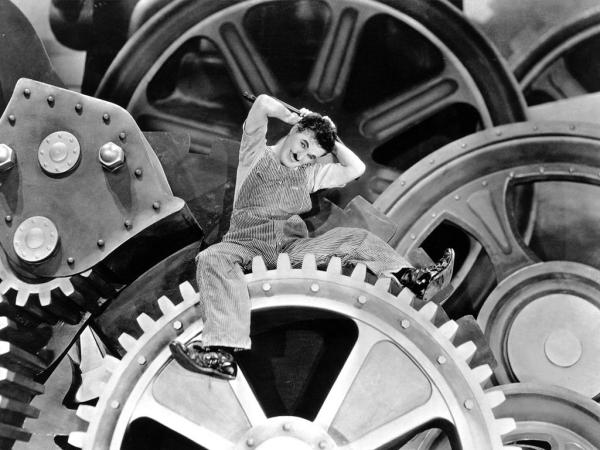We live in a society that is heralded as an efficient utopia.
The definition of efficiency is to be able to achieve an end goal with little to no waste, effort and energy. What is needed for that? Structure.
Let us try to imagine we are trying to create a machine that works as efficiently as possible. The ideal set of conditions would be the following:
- Different parts operate in a standard manner
- Each part runs close to its maximum capacity
- Minimal resistance or dysfunction
When these conditions are fulfilled, visions can be turned into reality and progress can be made rapidly. But something still feels amiss here…
Maybe a soul is missing?
What is a soul? When I speak of the soul, I am interested in neither a religious context nor a metaphysical definition. I will only interpret it as the core of humanity in which the highest values can manifest through.
Tradeoff between Soul and Structure
The soul is seemingly at odds with structure. In places where there is rigid structure, the soul seems to be less prominent. Why is that so?
Perhaps it might be useful to examine the traits that would be valued corresponding to each of the above conditions.
Valued Traits for Efficiency
1) Conformity/Predictability
Getting different parts to operate in a standard manner would require conformity or at least a high level of predictability in terms of its behaviour. Think about the use of a Standard Operating Procedure (SOP) which provides step-by-step instructions for workers to follow, thereby ensuring the smooth running of an organisation.
2) Hardwork/Performance
Getting each part to run close to its maximum capacity would require an emphasis to be put on hardwork and performance. Think about the use of a Key Performance Indicator (KPI) which sets a target for workers to achieve and plays a role in the evaluation of an organisation’s success.
3) Obedience
To minimise resistance or dysfunction, obedience would be desired.
However, the fact is that a human being is more sophisticated than that. Placing too much emphasis on efficiency can come at costs to the soul.
Costs of High Efficiency to the Soul
1) Going Against A Natural Rhythm
The soul follows its own rhythm. A universal life force with all its ebbs and flows runs through all living things. It is unnatural to follow a predetermined pattern with disregard for the changing circumstances of life. Take the stress of going through school curriculums and work deadlines even when one is going through life challenges for example.
Of course, it is not ideal to go to either extremes. There are times when we ought to have discipline to keep things running. Yet, the problem is that too much rigidity can lead to breakage. It is spoken of in Taoist philosophy that a tree that is unbending is easily broken.
A man is born gentle and weak.
At his death he is hard and stiff.
Green plants are tender and filled with sap.
At their death they are withered and dry.
Therefore the stiff and unbending is the disciple of death.
The gentle and yielding is the disciple of life.
Thus an army without flexibility never wins a battle.
A tree that is unbending is easily broken.
The hard and strong will fall.
The soft and weak will overcome.
Tao Te Ching Chapter 76
2) Overlooking The Limits of the Body and Mind
The soul knows how to observe the limits of the body and mind. In the pursuit of performance, it is easy to overlook the healthy limits of what people can be pushed towards. This is shown in the phenomenon of burnout, high stress and anxiety.
Especially in an age of high-speed technology, there are increasingly unrealistic expectations of what is to be achieved. We forget the virtue of patience and self-compassion which are essential for us to hold space for the recharging of our minds and bodies. The feeling of guilt over unproductivity remains a common struggle among many.
3) Suppressing Energy That Wants to Move (Emotions)
The soul is attuned to human emotions. However, emotions are often perceived to be a hindrance due to their unpredictable nature. As such, people are encouraged to suppress and shut off their emotions like a robot when work is involved.
In fact, emotions are signals from our inner selves to communicate something useful. By ignoring those, we lose the connection to our inner selves. We also lose connection with other humans when we deny the presence of emotions in our dealings with them. Humans are not rational and self-serving creatures as much as our present economic theory argues.
4) Basing Worth on Work
The soul knows its inherent worth. When a system tells people that their worth is only based on what they produce, it is easy for them to become overly identified with work and measure their worth according to performance and efficiency. Their freed up time will be filled up with more work because otherwise there is nothing to them. Work becomes their life and efficiency becomes their mantra.
5) Denying Soul-Truth
The soul has its own truth that it wants to follow. What happens when we are part of a machine is that we operate under someone else’s agenda which may not be aligned with our own.
Due to fear of rejection, many often resign to their fate of being a cog in the wheel. However, I believe that the soul will inevitably cry out when one continues to live in a way that is unaligned with their true values. Time will tell.
Conclusion
Efficiency provides a good foundation for society to operate and progress. However, something greater must be present for it to thrive. Let us not devalue the soul just to keep the machinery running.


